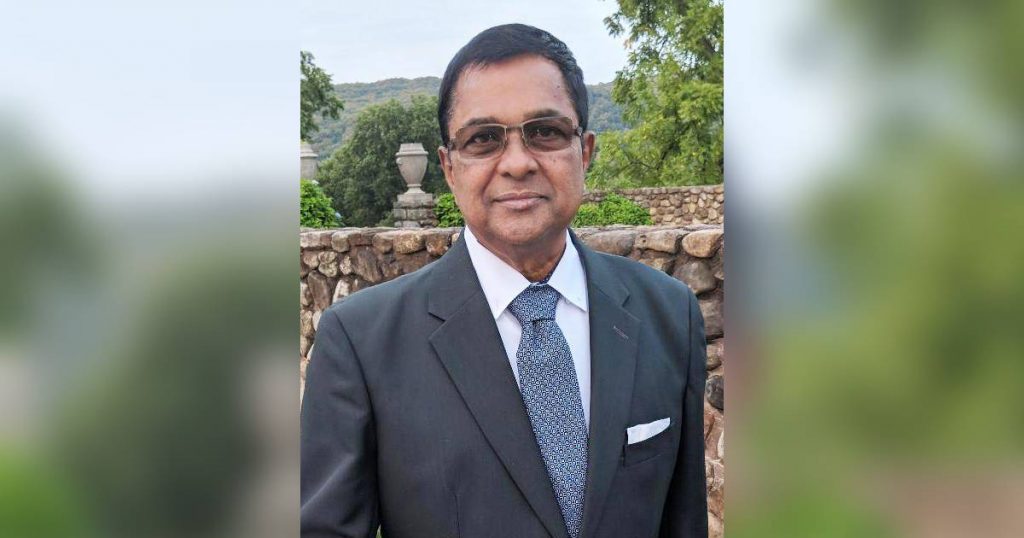Written by PARAS RAMOUTAR
Director General of the Indian government’s Indian Council for Cultural Relations (ICCR) Kumar Tuhin said he felt he had found a home away from home in Trinidad during his visit.
He said the people who came to the Mahatma Gandhi Institute for Cultural Cooperation to learn Indian culture form a bridge between the two countries.
Shri Tuhin was addressing an audience at the institute at Mt Hope on Thursday. He was visiting the centre as part of a tour of the council’s cultural centres worldwide.
During his visit to the centre, he planted a sapodilla tree alongside Indian High Commissioner Dr Pradeep Rajpurohit, and both men were given a tour of the facility, including the administrative offices, library, instrument and vocal classrooms, dance and yoga rooms, classrooms where Hindi is taught, and the auditorium. Director of the Gandhi Centre, Ms Ramaya Ajay conducted the tour.
The dignitaries also met prominent members of the Indian diaspora, heads of cultural organisations, and eminent artists, and they included President of the National Council for Culture (NCIC), Senator Deoroop Teemal; Vice President of NCIC, Surujdeo Mangaroo; Pundit Dr Rampersad Parasram, Dharmacharya of the Sanatan Dharma Maha Sabha; and former Government Minister, Trevor Sudama
Shri Tuhin said this was his first visit to TT, and the IRCC had great hopes for the institute, which was the largest such centre in the region.
“When I landed only four days into my trip to various countries, I am thinking I have come back home. In TT, I have met friends today, experts and dignitaries. I truly feel that I have found a place that is a home away from India, a true home for myself,” he told the assembly of over 200 invitees.
“Therefore I think that the choice for this centre, the biggest and largest in the Caribbean, to be housed in Port of Spain, TT, was the perfect decision, was the right decision made by the government of India and for this we would also like to thank the TT government for their help and assistance in making this a reality.”, he noted
The ICCR was founded in 1950 by independent India’s first education minister, Maulana Abul Kalam Azad. Its website said its objectives are to participate actively in the formulating and implementing policies and programmes pertaining to India’s external cultural relations; to foster and strengthen cultural relations and mutual understanding between India and other countries; to promote cultural exchanges with other countries and people; and to develop relations with nations.
Shri Tuhin said the work of the ICCR was cultural diplomacy as part of the Ministry of External Affairs.
“Diplomacy by its own gives a sense of being a complicated matter that is between governments and it’s supposed to be a very formal thing”, Shri Tuhin noted
Shri Tuhin added: “If you look at the word ‘culture,’ it is a word that is deep in meaning, and also a word whose meaning has expanded over the years. Now if you had asked me the meaning before, I would have included music and dance and art and so forth, but now the meaning of culture also includes so many other aspects which were not considered cuisine
Shri Tuhin said ICCR could not spread Indian culture alone, but needed the assistance of connections between people of different cultures and geographies.
“That is where your work comes in. The people who have come here today, your work is more important than the work being done by ICCR and other agencies. The fact that you come here to learn to dance or Hindi or art or some other art form, you become a bridge and a bond of friendship between India and TT. This is a country with which we have always maintained close ties. We are thankful to you because you have preserved the ties carefully and with a lot of sensitivity, and therefore we value your friendship, we value that you are coming here, we value your association.”
Shri Tuhin told the audience the institute wanted to work in partnership with them in any activities they were involved in.
“ICCR is over 70 years old and has several activities and plans, including business programmes, scholarships , among several others.
The Centre was inked between the late Prime Ministers of India, and Trinidad and Tobago Indira Gandhi and Dr Eric Williams in 1988, during the former’s visit here. There were several operational delays until its construction and eventual opening in 2020.
